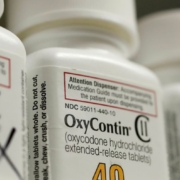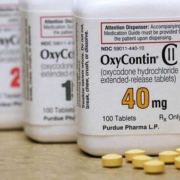A sub-variant of the highly transmissible Omicron version of coronavirus known as BA.2 is now dominant worldwide, prompting surges in many countries in Europe and Asia and raising concern over the potential for a new wave in the United States.
Teva Pharmaceutical Industries and AbbVie will pay the state of Rhode Island a combined $28.5 million to settle opioid-related claims against the companies.
Rhode Island was set to square off on March 14 against Teva Pharmaceutical Industries Ltd., as a multibillion-dollar trial begins over whether the Israeli company contributed to an opioid crisis that has caused more than 500,000 deaths over the past two decades.
One day after U.S. bankruptcy judge Robert Drain approved an opioid settlement plan that locks Purdue Pharma’s Sackler family into paying about $6 billion into the nationwide fund, family members of those whose lives were devastated by addiction to drugs like OxyContin confronted the de facto face of the nation’s opioid crisis in court.
The Sackler family owners of Purdue Pharma LP reached a deal with nine state attorneys general to pay up to $6 billion in cash to resolve widespread litigation alleging that they fueled the U.S. opioid epidemic, bringing the OxyContin maker closer to exiting bankruptcy.
A mediator in Purdue Pharma’s bankruptcy case on March 2 indicated an agreement was being drafted between the company’s owners and U.S. states pressing for more money to resolve allegations that the OxyContin maker fueled the opioid epidemic.
The U.S. Food and Drug Administration approved the use of Purdue Pharma’s candidate injectable treatment for partially or completely reversing opioid drug effects.
The Sackler family owners of Purdue Pharma LP proposed a new and larger settlement worth up to $6 billion to resolve allegations that the OxyContin maker and the company’s owners contributed to the deadly U.S. opioid epidemic, a mediator’s report showed on February 18.
President Joe Biden said on February 18 the U.S. national emergency declared in March 2020 due to the COVID-19 pandemic will be extended beyond March 1 due to the ongoing risk to public health posed by the coronavirus.
Misinformation about science is increasingly prevalent and a significant public health threat that the U.S. Food and Drug Administration will focus on fighting, incoming Commissioner Robert Califf said on February 17.










